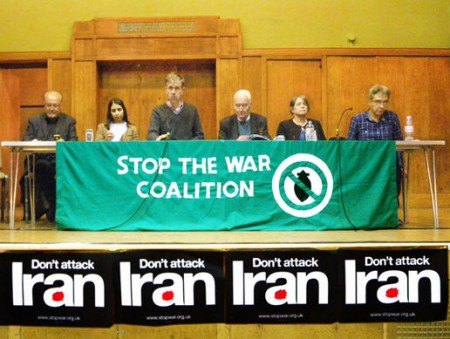
Atsushi Tago claims that they are. His presentation at the CIS Colloquium series on Thursday (March 15, 2012) aimed to challenge mainstream opinion – including the results of his own previous research – and prove that, apart from solely international factors, domestic factors also matter in explaining why a country chooses to join an ad-hoc military coalition. With the quantitative analysis he presented, he was trying to validate a particular hypothesis: that in an election year, in an economic recession, or in period of domestic riots, a country is less likely to join a military coalition. In view of the upcoming elections in Israel and the US, Tago’s research could be of considerable interest for professionals and academics working with the Iranian nuclear issue.
Tago’s logic is threefold: first, he claims that the true benefits (or detriments) of joining a coalition force are often hidden from the electorate. Therefore, in an election year, governments will be reluctant to participate in armed coalitions for fear that the people will voice their disapproval at the ballot.
On this first point, one wonders whether anyone – government officials or voters – can realistically assess the costs and benefits of, say, joining a coalition to fight Saddam Hussein. Or, as a CIS senior fellow at the colloquium asked, why it would be in the government’s interest to hide the benefits of joining a coalition when, by communicating these benefits to voters, the ruling parties could potentially gain more supporters. What if elections are purely symbolic? Would the incentives be the same? Not fully addressing these issues might have contributed to the fact that Tago did not find a significant correlation between being in an election year and the likelihood of joining a coalition. That is, being in an election year will not make a difference in a country’s decision to participate in a military coalition.
Tago’s second and third arguments are based on resource scarcity. In his second argument, he claims that domestic riots consume a significant portion of a country’s defense resources, thus decreasing the likelihood of contributing to an armed coalition. If police forces, the military, and their equipment are heavily engaged domestically, then joining an armed coalition is indeed more costly.
Third, economic recession implies that engagement in a military conflict requires the government to reallocate additional funds from an already tight budget. Clearly, unplanned costs such as sudden participation in armed coalitions are harder to accept in times of economic hardship. Rather unsurprisingly, then, Tago found a statistically significant correlation between domestic riots and recession, on the one hand, and decreased likelihood of participation in armed coalitions, on the other—though alas, both of these correlations are weak.
Returning to the issue of potential conflict in the Middle East, Tago’s findings would predict that the willingness of the US and Israel to form a coalition against Iran would not be predicated upon the fact that they are both currently in an election year. Rather, economic constraints and other factors such as violent domestic riots could decrease the chances of joint action.
We are keen to follow Tago’s progress on this topic, as his results will no doubt become more robust with the inclusion of more cases (the present dataset is limited to eight wars from 1982 to 1999), non-US-led coalitions, and a better distinction between UN-sanctioned coalitions and “coalitions of the willing.”

